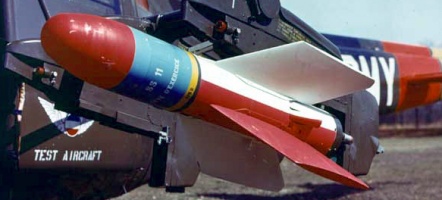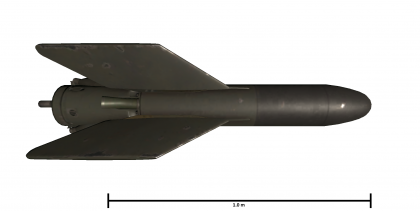Difference between revisions of "SS.11"
m (→Description) |
Colok76286 (talk | contribs) (Edits) |
||
| Line 5: | Line 5: | ||
[[File:WeaponImage SS.11.png|thumb|left|420px|The SS.11 missile (scale is approximate)]] | [[File:WeaponImage SS.11.png|thumb|left|420px|The SS.11 missile (scale is approximate)]] | ||
{{Break}} | {{Break}} | ||
| − | The '''{{PAGENAME}}''' (SS = French: sol-sol or surface to surface), also known as the '''AS.11''' (air-sol) for aircraft-mounted variants, is a manual command to line of sight (MCLOS) wire-guided anti-tank missile developed by French aviation manufacture Nord Aviation. | + | The '''{{PAGENAME}}''' (SS = French: sol-sol or surface to surface), also known as the '''AS.11''' (air-sol) for aircraft-mounted variants, is a manual command to line of sight (MCLOS) wire-guided anti-tank missile developed by French aviation manufacture Nord Aviation. It also served in other Armed Forces in which it received a different name: '''RB 52''' for Sweden and '''Tager''' for Israel. |
| − | |||
| − | |||
=== Vehicles equipped with this weapon === | === Vehicles equipped with this weapon === | ||
| Line 27: | Line 25: | ||
== General info == | == General info == | ||
| − | ''Tell us about the tactical and technical characteristics of the missile.'' | + | <!-- ''Tell us about the tactical and technical characteristics of the missile.'' --> |
| + | Developed in the early 1950s, the SS.11 began production in 1956 and was fielded in the French military. Initially launched from ground vehicles, the French found success in launching these surface-to-surface missiles from fixed-wing aircraft during the Algerian war (1958-1662) in an air-to-ground application. The French went further to adapt this missile to also be fired from a helicopter platform. The [[SA.313B Alouette II|Alouette II]] was the first helicopter outfitted with the SS.11 and was instantly successful at exploiting this weapon. The Alouette had the ability to work its way to a target which could not be duplicated with fixed-wing aircraft and became a force multiplier with much success in so that when [[SA.316B Alouette III|Alouette III]] helicopters began production, they were already configured to accept the SS.11 as one of the many armaments available for use. | ||
| + | |||
| + | Being classified as an MCLOS, the SS.11 is not a fire-and-forget type missile which will home into a target on its own, on the other hand, it requires a missile operator to "fly" the missile to its target. The missile is connected to the firing vehicle throughout its flight by a series of very thin wires. Communications conducted through the wires allowed the missile operator to guide the flying missile to its target allowing some movement around barriers and obstacles if needed. If the target was outside of the range of the total length of wires, the wires would disconnect and the missile would become an unguided rocket until it either hit its target or crashed into another object or ran out of fuel and crashed. | ||
=== Effective damage === | === Effective damage === | ||
| Line 42: | Line 43: | ||
'''Pros:''' | '''Pros:''' | ||
| + | |||
* Wire-guided, allows the operator to guide the missile to the target even potentially "hidden" targets | * Wire-guided, allows the operator to guide the missile to the target even potentially "hidden" targets | ||
'''Cons:''' | '''Cons:''' | ||
| + | |||
* Limited length of wire, can disconnect and become uncontrollable | * Limited length of wire, can disconnect and become uncontrollable | ||
* Difficult to use in close, best for targets 500 m away or more | * Difficult to use in close, best for targets 500 m away or more | ||
| Line 58: | Line 61: | ||
* ''reference to the article about the variant of the weapon;'' | * ''reference to the article about the variant of the weapon;'' | ||
* ''references to approximate analogues by other nations and research trees.'' --> | * ''references to approximate analogues by other nations and research trees.'' --> | ||
| + | |||
* [[AGM-22]] - American version of SS.11 MCLOS | * [[AGM-22]] - American version of SS.11 MCLOS | ||
| Line 63: | Line 67: | ||
''Paste links to sources and external resources, such as:'' | ''Paste links to sources and external resources, such as:'' | ||
* ''topic on the official game forum;'' | * ''topic on the official game forum;'' | ||
| − | |||
* ''other literature.'' | * ''other literature.'' | ||
Revision as of 18:39, 1 April 2022

Contents
Description
The SS.11 (SS = French: sol-sol or surface to surface), also known as the AS.11 (air-sol) for aircraft-mounted variants, is a manual command to line of sight (MCLOS) wire-guided anti-tank missile developed by French aviation manufacture Nord Aviation. It also served in other Armed Forces in which it received a different name: RB 52 for Sweden and Tager for Israel.
Vehicles equipped with this weapon
Helicopters:
Ground Vehicles:
General info
Developed in the early 1950s, the SS.11 began production in 1956 and was fielded in the French military. Initially launched from ground vehicles, the French found success in launching these surface-to-surface missiles from fixed-wing aircraft during the Algerian war (1958-1662) in an air-to-ground application. The French went further to adapt this missile to also be fired from a helicopter platform. The Alouette II was the first helicopter outfitted with the SS.11 and was instantly successful at exploiting this weapon. The Alouette had the ability to work its way to a target which could not be duplicated with fixed-wing aircraft and became a force multiplier with much success in so that when Alouette III helicopters began production, they were already configured to accept the SS.11 as one of the many armaments available for use.
Being classified as an MCLOS, the SS.11 is not a fire-and-forget type missile which will home into a target on its own, on the other hand, it requires a missile operator to "fly" the missile to its target. The missile is connected to the firing vehicle throughout its flight by a series of very thin wires. Communications conducted through the wires allowed the missile operator to guide the flying missile to its target allowing some movement around barriers and obstacles if needed. If the target was outside of the range of the total length of wires, the wires would disconnect and the missile would become an unguided rocket until it either hit its target or crashed into another object or ran out of fuel and crashed.
Effective damage
Describe the type of damage produced by this type of missile (high explosive, splash damage, etc)
Comparison with analogues
Give a comparative description of missiles that have firepower equal to this weapon.
Usage in battles
Describe situations when you would utilise this missile in-game (vehicle, pillbox, base, etc)
Pros and cons
Pros:
- Wire-guided, allows the operator to guide the missile to the target even potentially "hidden" targets
Cons:
- Limited length of wire, can disconnect and become uncontrollable
- Difficult to use in close, best for targets 500 m away or more
History
Describe the history of the creation and combat usage of the weapon in more detail than in the introduction. If the historical reference turns out to be too long, take it to a separate article, taking a link to the article about the weapon and adding a block "/ History" (example: https://wiki.warthunder.com/(Weapon-name)/History) and add a link to it here using the main template. Be sure to reference text and sources by using <ref></ref>, as well as adding them at the end of the article with <references />.
Media
An excellent addition to the article would be a video guide, as well as screenshots from the game and photos.
See also
- AGM-22 - American version of SS.11 MCLOS
External links
Paste links to sources and external resources, such as:
- topic on the official game forum;
- other literature.




